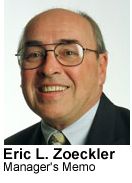 |
|
|
YOUR
COUNTY.
|
YOUR
BUSINESS JOURNAL.
|
Published August 2004
Facilitator can keep meetings focused, flowing
 Q.
As office manager, my boss has assigned me an additional duty I’m worried
about successfully accomplishing. To improve the content and results of
our regular office meetings, he has appointed me to be the regular meeting
facilitator. He said a facilitator leads the meeting and determines the
agenda, the participants and controls the timing of the session. That
seems a general description, are there any specifics?
Q.
As office manager, my boss has assigned me an additional duty I’m worried
about successfully accomplishing. To improve the content and results of
our regular office meetings, he has appointed me to be the regular meeting
facilitator. He said a facilitator leads the meeting and determines the
agenda, the participants and controls the timing of the session. That
seems a general description, are there any specifics?
A. Your boss may be onto a productive new strategy. Meetings, as we all know, can be the bane of the modern workplace. Researchers estimate that half the money spent on meetings (a pro-rata amount of the participants’ salaries) is wasted and that fully one-third of meeting time is unproductive.
Even so, we just can’t seem to stop having meetings. We meet to discuss when to call the next meeting. We meet to evaluate the last meeting. We meet to plan strategy for the next meeting. The higher you’re promoted, the more meetings you attend.
Yet, a business meeting can be a productive, creative and problem-solving tool if important guidelines are followed. Most meetings fail because too often they merely deliver information or advance one individual’s agenda (usually the boss).
We often forget there are more direct and effective ways of disseminating information to people than through meetings, such as e-mails, newsletters or other written documents. Frequent meetings to disseminate information or discuss routine occurrences often are regarded by busy workers as time consuming and boring. As the meeting facilitator, ask staff members whether they’d prefer to receive the needed information in a different format or schedule fewer routine meetings.
An effective meeting facilitator has many responsibilities, first and foremost deciding whether a meeting is the best way to deal with the issue to be decided. Facilitators also work to ensure that meetings stay focused and that participants are allowed to thoroughly contribute to the outcome. Very often, the boss has difficulty with allowing such meaningful participation by employees.
Here are some other suggestions to enhance meeting effectiveness:
- Plan, then plan some more. An agenda should include time blocks for individuals who will speak and for brainstorming. Distribute the agenda a few days in advance to start people thinking. Some experts say the facilitator should know the outcome of the meeting before it occurs.
- Stick to the issue at hand. If your objective is devising a strategy to win a contract, allow only discussion of how it should be done. Facilitators should limit their participation to suggesting a few ideas to get the discussion going. Then, pass the discussion to the participants to complete the creative process.
- Encourage brainstorming. If you determine brainstorming to be a part of a meeting’s successful outcome, break up groups into teams of three, which research has shown as the optimum size for group discussion. Pose the same question to each team, then bring them back together for the presentation of the findings.
- Show respect. If discussion goes beyond the schedule, ask the participants if they approve spending the extra time.
- Summarize. Periodically, recap what has been accomplished. This reinforces the notion that progress is being made and the time spent worthwhile. Present a more detailed summary at the end. Determine whether a follow-up meeting is necessary and schedule it then.
Eric Zoeckler operates The Scribe, a business writing service with many Snohomish County-based clients. He also writes a column on workplace issues that appears in The Herald on Mondays. He can be reached at 206-284-9566 or by e-mail to mrscribe@aol.com.
© 2004 The Daily Herald Co., Everett, WA








